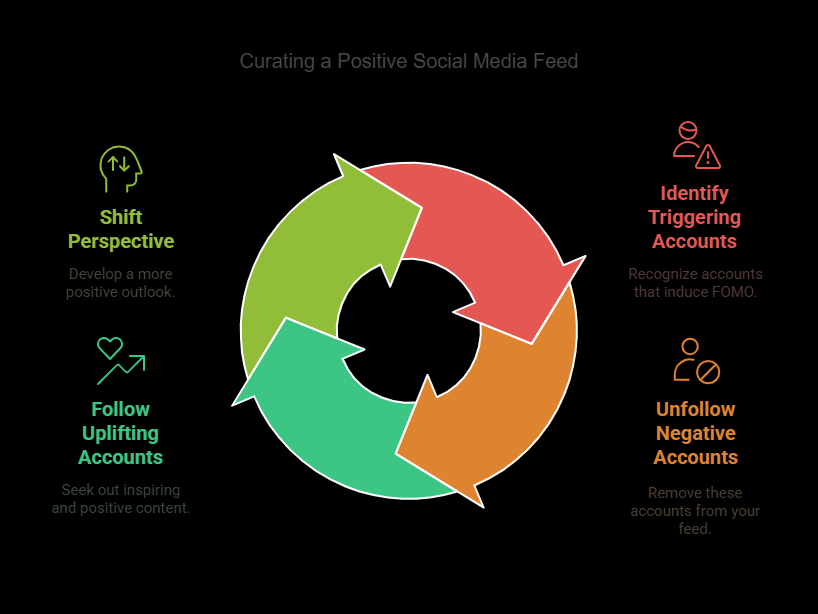Scrolling through social media can make it seem like everyone else is ahead in life—friends on dream holidays, colleagues celebrating promotions, influencers living flawlessly. If you face any of these, you might be experiencing FOMO (Fear of Missing Out). This experience can cause anxiety that can impact mental well-being and create self-doubt. A Mental Health Course can help build resilience and provide strategies to manage these effects. So, What is FOMO exactly? The unsettling feeling that others are experiencing more, heightened by social media algorithms, fuels comparison. Let’s explore how social media fuels FOMO and what we can do about it.
The Algorithm Knows You Too Well
Ever noticed how your feed seems to know exactly what will grab your attention? Social media platforms track every click, like, and share to personalise your experience. The more time you spend interacting with certain types of content, the more similar posts you’ll see.
For example, if you engage with luxury travel posts, your feed will be filled with exotic destinations, dulling your everyday life. The same goes for career success stories, fitness journeys, or social events. Algorithms reinforce these themes, leading to an endless cycle of comparison and dissatisfaction. This can make you feel more anxious and doubtful of yourself, which makes it harder to see your progress.
Moreover, the algorithm doesn’t just reflect your interests—it amplifies them. If you linger on negative or controversial content, you may find yourself trapped in an echo chamber of pessimism and outrage. This reinforcement can shape your perceptions and mood, making social media a powerful yet potentially harmful influence on your mindset.
Highlight Reels vs Real Life
Social media thrives on highlights. People rarely post their struggles, bad days, or failures. Instead, we see curated snapshots of success, adventure, and happiness. This selective sharing distorts reality, making it seem like everyone else lives their best life while we’re in the ordinary.
When the algorithm continuously feeds us these highlight reels, it creates unrealistic expectations. We begin to measure our lives against an impossible standard, leading to feelings of inadequacy, anxiety, and stress. Awareness of this distortion can help us manage expectations and develop a healthier perspective.
Additionally, this culture of perfectionism discourages authenticity. Many users feel pressured to maintain an idealised online persona, filtering out anything that doesn’t fit the narrative. Over time, this can make it difficult to be vulnerable or express real emotions, both online and in real life.
The Dopamine Loop: Why You Keep Scrolling
Social media is addictive for a reason. Each like, comment, or notification triggers a small dopamine release, creating a sense of reward. This keeps users coming back for more, seeking validation and engagement.
However, this cycle can also heighten FOMO. A post that doesn’t receive the expected attention can lead to feelings of rejection or self-doubt. Similarly, seeing others receive high engagement can make users feel they’re not as popular, successful, or interesting. Over time, this can reduce self-esteem and lead to compulsive social media use.
Beyond that, the constant stimulation from scrolling rewires our brains to crave instant gratification. The more we rely on social media for quick bursts of excitement, the harder it becomes to focus on deeper, more fulfilling activities like reading, learning new skills, or even engaging in face-to-face conversations.
The Pressure to Keep Up
Social media fosters the idea that you must always be doing something exciting. Whether attending events, travelling, or achieving career milestones, the pressure to ‘keep up’ can be overwhelming. Exposure to endless ‘better’ options can create unnecessary dissatisfaction even when people are content with their lives.
This pressure can lead to burnout, overspending, or even making choices for social validation rather than genuine happiness. It becomes less about enjoying experiences and more about proving one’s worth online. Taking a step back and focusing on personal fulfilment rather than digital validation can help break this cycle.
How to Break Free from FOMO

Conclusion
Social media isn’t inherently bad, but its algorithms are designed to keep you hooked, often at the expense of your mental health. Recognising how these systems fuel FOMO is the first step in regaining control.
If you’re interested in understanding the deeper effects of social media on mental health, consider exploring a mental health course to gain valuable insights. The Knowledge Academy offers free resources to help individuals build resilience and navigate the digital world more mindfully.
